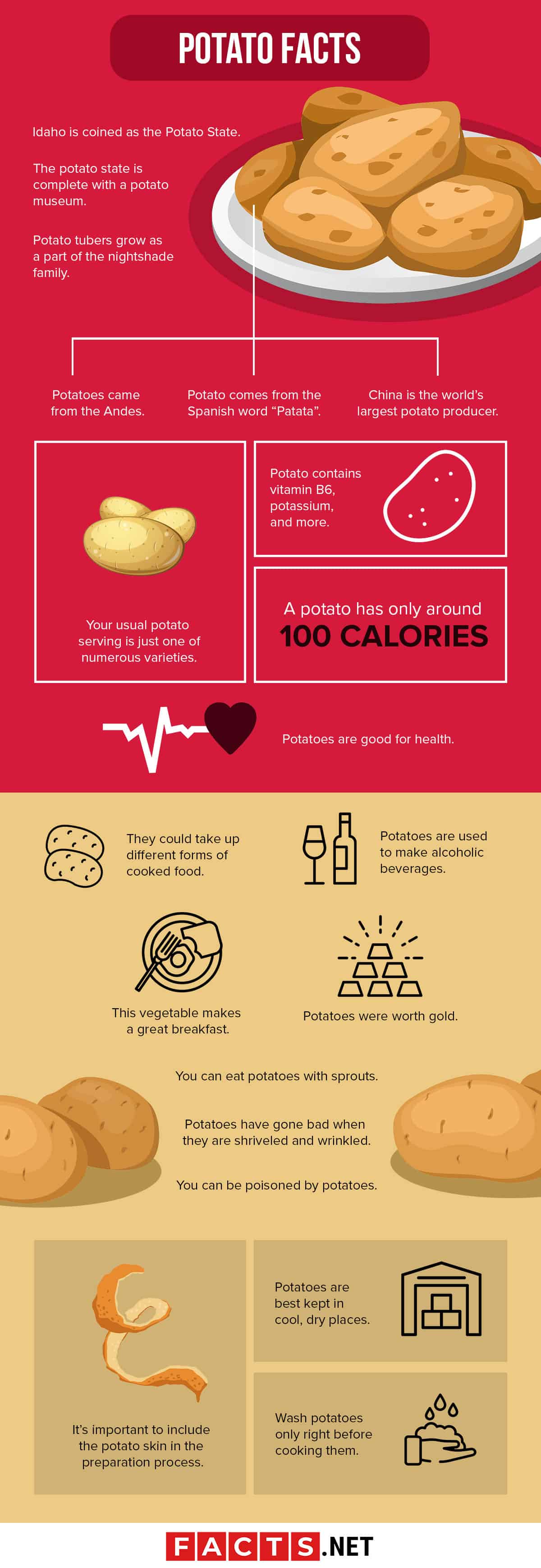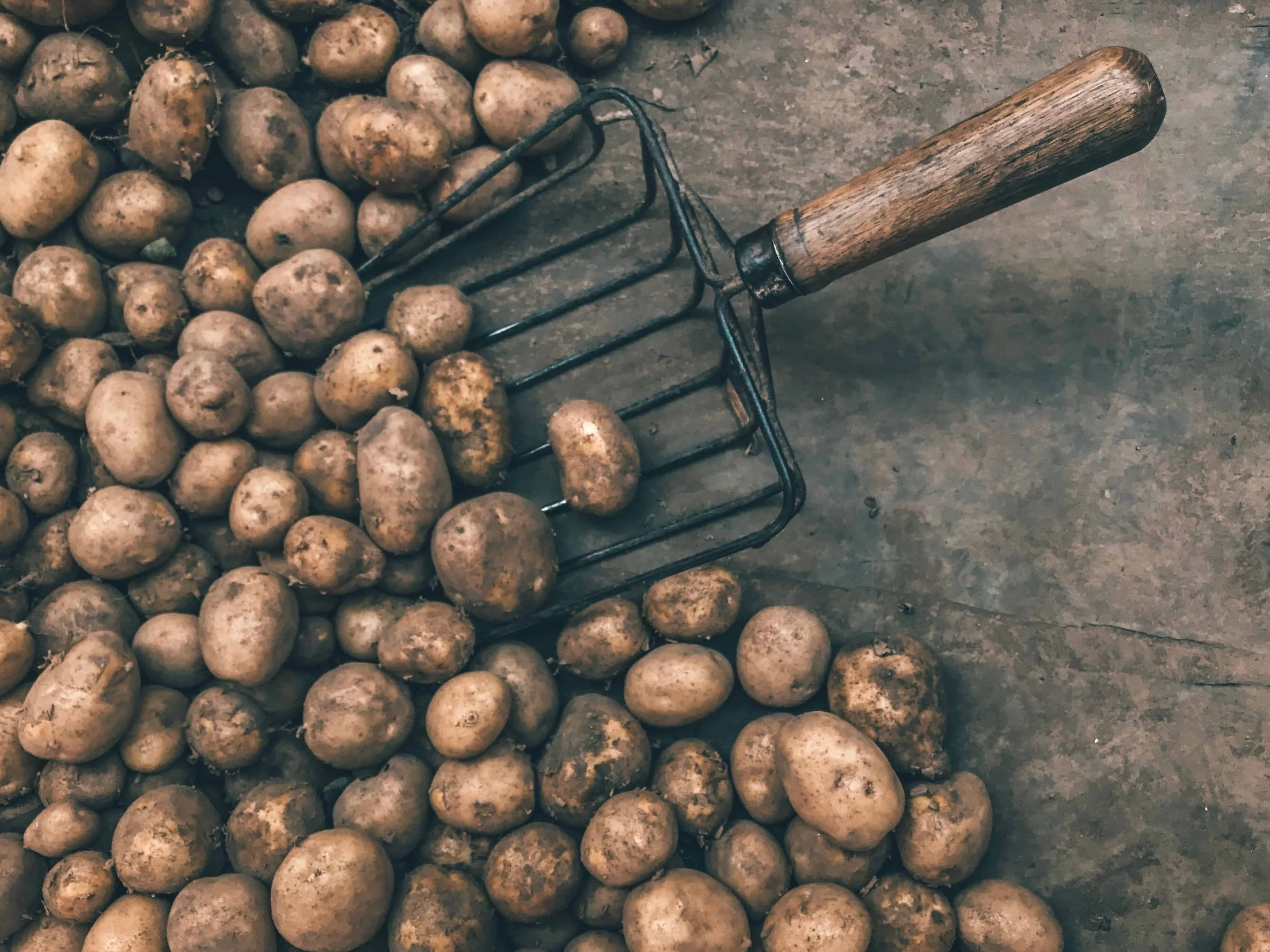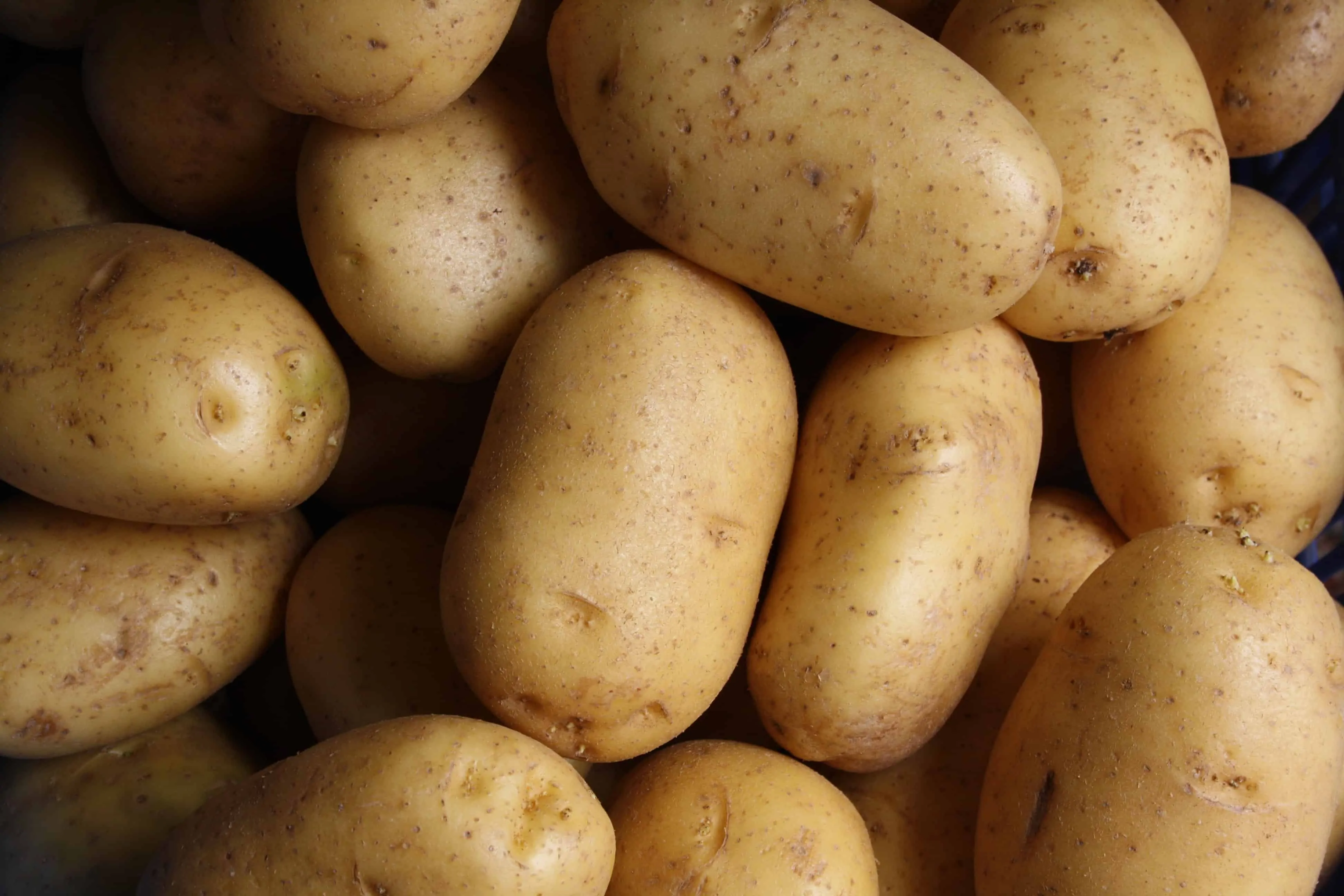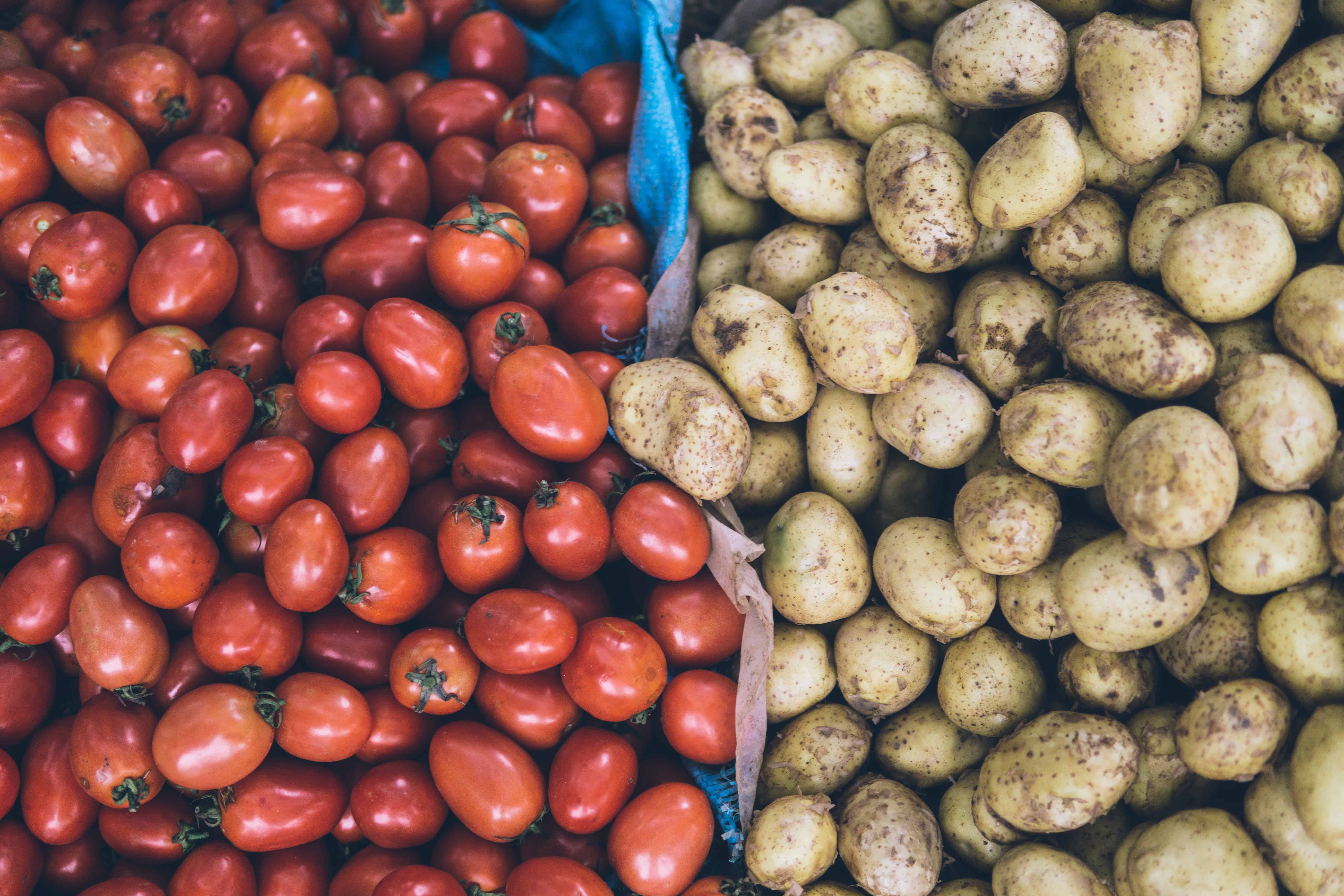
- Potato is a vegetable.
- Potato’s roots trace back to Peru where the Incas natives were the first to grow the crop.
- Despite its appearance, potato is made up of 80% water and only 20% of solid.
- Potato varieties have grown over the centuries, and there are around 100 of the edible kind.
- Potato is also known as a spud.
- There are 8 – 10 small white potatoes in a pound, while only 3 medium russet ones can fit.
- Potatoes are best kept in a cool, dark, and well-ventilated storage space. This way, they can last up to 2 weeks.
- You may have your potatoes boiled, baked, or fried, but it can also be used in brewing drinks, fixing stuff, and even as medicine.
- Potato is rich in nutrients that enable it to supply almost all the food elements necessary for the nutrition of the human body.
- Potato is second to milk as the most consumed food in the United States.
- Potato ranks the fourth most produced staple. The top three are wheat, corn, and rice.
- Although potatoes vary in shape and size, their average weight is at 300 grams or 10 ounces.
- Potatoes are easy to grow, can survive without huge amounts of chemical additives, and are considered as one of the most environment-friendly vegetables.
- Its role as one of the most important crops in the world extended to Ireland in the 17th century, and in continental Europe towards the end of the 18th century.
- Potatoes assumed the role of a basic unit of measurement when the ancient Incas civilization used the time it takes to cook potato to measure time.
- The world saw the largest potato ever grown in 2010 when farmer Peter Glazebrook showed the 8lb 4oz wonder from his Hallam back garden in Nottinghamshire.
- Another one for the record, potato is the first-ever vegetable successfully grown in space when it was taken with the space shuttle Columbia in 1995.
- Potato might be a vegetable, but it beats orange in having more vitamin C, banana with more potassium, and apple with more fiber content.
- King Louis XVI and Queen Marie Antoinette popularized potatoes in France after they received a bouquet of potato flowers and the latter wearing them on her hair.
- Mr. Potato Head was one of the first children’s toy to be advertised on U.S. TV.
Potato Facts Infographics

Potatoes came from the Andes.
The vegetable’s existence is quite old age as its domestication dates approximately between 8000 and 5000 BC in Peru or Bolivia, known as the Andes back then. Still, its earliest verified tuber was found in 2500 BC at the Ancon coastal site and the Incas cultivated it as early as 1800 years ago.
Potato comes from the Spanish word “Patata”.
Semantically speaking, the potato has a rather Spanish origin. It came from the Spanish word ‘patata’ in the 1950s, which then stemmed from the Caribbean language ‘batata’ or “sweet potato”. Today, the word comes by other slang terms such as spud, tater, and tattie.

China is the world’s largest potato producer.
China is the world’s largest potato producer and exporter, while the countries India, Germany, Ukraine, Russia, Poland, and the United States are leading producers as well. In the USA alone, all 50 of its states grow the tuber crop, with Idaho and Washington being the largest ones.
Idaho is coined as the Potato State.
Idaho might be a late bloomer in the potato growing part, but it still became known as the potato state for an amazing reason. They only started growing potatoes in 1836, but once the russet, the state’s most famous potato variety, was cultivated in 1872, Idaho was in for a historic ride.
The potato state is complete with a potato museum.
Of course, the “potato state” won’t be complete without its potato museum. It seemed fitting for a group of locals to feature the significance of potatoes in their economy. Hence, the display of the renowned potato tribute since 1913.
Potato tubers grow as a part of the nightshade family.
The potato plant is part of the Solanaceae, or the nightshade family. Their starchy edible tubers are the main reason why they are widely grown, produced and consumed.
Your usual potato serving is just one of numerous varieties.
That potato that you had for dinner is just one of the many varieties of the tuber crop, with it being the Sebago or common potato in particular. Other known types are the Russet Burbank, Pontiac (with the thin red skin), Pink Eye (Tasmanian Pink Eye), Kipfler, Spunta and Pink Fir Apple.
Potato contains vitamin B6, potassium, and more.
Potato a.k.a. near-perfect food is 99.9% fat-free and contains vitamins B6, C, E, K, and minerals like potassium, magnesium and phosphorous.
A potato has only around 100 calories.
A medium-sized potato contains 110 calories. Now, compare that to the 225 calories of one-cup rice and the 115 calories of one-cup pasta.
Potatoes are good for health.
Potatoes are known to be good for the stomach, spleen, and intestines. They could also boost heart health, improve digestion, strengthen the immune system and maintain fluid balance.

They could take up different forms of cooked food.
Cooked or not, there are nearly endless things that you could do with potatoes. Meals all over the world are already blessed with the individual wonders of potatoes when boiled, baked, fried, mashed, or when made into soup and even into chips!
Potatoes are used to make alcoholic beverages.
Not just good to chew, potatoes are good to drink as well. They could also be used to brew certain types of alcoholic beverages like Vodka, Akvavit, or Poitín.
This vegetable makes a great breakfast.
Given its many nutritional contents, it is best to eat potatoes for breakfast as they could well provide all the minerals you need to keep you healthy throughout the day.
Potatoes were worth gold.
There was a time when potatoes were traded with gold directly. Back in the 1890s, the Alaskan Klondlike gold rush potato had very high value due to its essential Vitamin C content.
You can eat potatoes with sprouts.
Yes, you can! Despite the new sprout coming, potatoes are still safe to eat as long as they are still firm to the touch. Just remove the sprouts and go on with your plan recipe. Unless it’s too wrinkly and shriveled already, then you might as well just call for delivery.
Potatoes have gone bad when they are shriveled and wrinkled.
Once you see that your little patooties are starting to shrivel and have more wrinkles, then it means that they have lost more of its nutrients. In other words, it’s not that palatable anymore so you would have to have a change of plans or your recipe won’t taste anywhere near what you expect it to.
You can be poisoned by potatoes.
One could suffer from potato poisoning upon consuming leaves and green stems. These parts contain toxic solanine which could cause potato plant poisoning with symptoms such as abdominal pain, fever, nausea, headaches, and vomiting. It may take up to 8-10 hours from consumption before the onset of such signs.
Potatoes are best kept in cool, dry places.
Dry, dark places are the perfect storage setting for potato. When kept at 45-50 degrees Fahrenheit, they could even last up to three months. Higher temperatures could cause sprouting and shriveling of the supply, shortening its lifespan to only a week. Likewise, too cold storage settings could darken potato when cooking.
It’s important to include the potato skin in the preparation process.
It’s best to boil, steam or bake potatoes in their skins, as their nutrients lie very close to these parts. Peeling them before cooking could cause the loss of these nutrients. Soaking peeled potato in water is also not recommended as its nutritious contents could dissolve in water.
Wash potatoes only right before cooking them.
You shouldn’t wash your potatoes prior to storing as it would only speed up your supply’s decay. Save the washing part to right before you cook it.
Potatoes can grow to a height of 4700 meters.
The common commercial varieties of the crop are just a few of the 5,000 known varieties that have their individual culinary and agricultural attributes. What’s even more amazing is that they could grow from sea level up to 15,420 feet above sea level. That’s a good 4,700-meter rise right there!

You can live off potatoes.
The scientists have claimed it, you could live off potatoes. Just pair it with a fair serving of milk or butter, and you’re good to go with almost all the nutrients that a human body needs to survive.
Over a billion people eat at least 1 potato each day.
It’s safe to say that potato is a well-loved food, considering the fact that over a billion people eat at least one potato each day. The average American consumption is at 140 pounds of potatoes per year, while the Germans consume more than 200 pounds of potatoes per year.
Potato tops in most produced and most consumed food.
Despite the couch potato association with lazy bums, this nutritious vegetable has been setting world records here and there. It is the fourth most-produced crop, the most consumed food in countries, and is even the first vegetable that was ever grown in space.
Potato flowers were big in fashion.
Potatoes seem to like to go big, as their influence even reached that of royal fashion. French Queen Marie Antoinette gave birth to potato in fashion inspired by the bouquet of potato she received. The flower instantly became trendy once she made a public appearance with it as decorations to her clothing.
Potatoes ventured into art.
This unbelievable crop might as well be the celebrity of the food-verse. Its role extended towards the masterpieces of world-renowned artists. You could find words and illustrations of potato in Shakespeare’s The Merry Wives of Windsor, Van Gogh’s Potato Eaters, and James Joyce’s Ulysses.
There is a blue-violet colored potato.
Potato also comes in a unique blue-violet color. The vitelotte noire, or simply vitolette, is a gourmet French potato variety which dates its cultivation in France at least since the early 19th century. Because of its remarkable color, it is also called the Chinese truffle. Most importantly, this variety is known to be a great antioxidant.
Potato is the ultimate voyager’s food.
Since its space pioneer feat, the potato became a vital part of the goal to feed space voyagers on long expeditions and future space colonies in the future. If its attributes are not fit enough yet for the role, then what other option is there, right?

Tomtato is half tomato, half potato.
Also known as ‘pomato,’ the tomtato is the product of a grafted potato plant and tomato plant. This efficient strategy could grow both potatoes and tomatoes, and there is little to no effect on the quality. Hence, valuable garden and field space could be saved.
There is a National Potato Day.
Such greatness can’t go unobserved right? Aside from celebrating National Potato Day (or days) every August 19 and October 27, the United Nations even declared 2008 as the official Year of the Potato. All hail potatoes!
One Last Seed for Thought
Potatoes are now more recognized through the many things that people could do with them. The infamous french fries, hash browns, chips, and crisps are just some. But while it is not an entirely bad thing, it could give some people the wrong idea that potatoes are not healthy and does no good to the human body – the exact opposite of its true nature. These facts are a good step to inform people about the roots of the crop, its contributions to history, society and economy, and its numerous benefits to humans. Keep as much as you can in mind the next opportunity you get to munch on these taters!
Was this page helpful?
Our commitment to delivering trustworthy and engaging content is at the heart of what we do. Each fact on our site is contributed by real users like you, bringing a wealth of diverse insights and information. To ensure the highest standards of accuracy and reliability, our dedicated editors meticulously review each submission. This process guarantees that the facts we share are not only fascinating but also credible. Trust in our commitment to quality and authenticity as you explore and learn with us.
